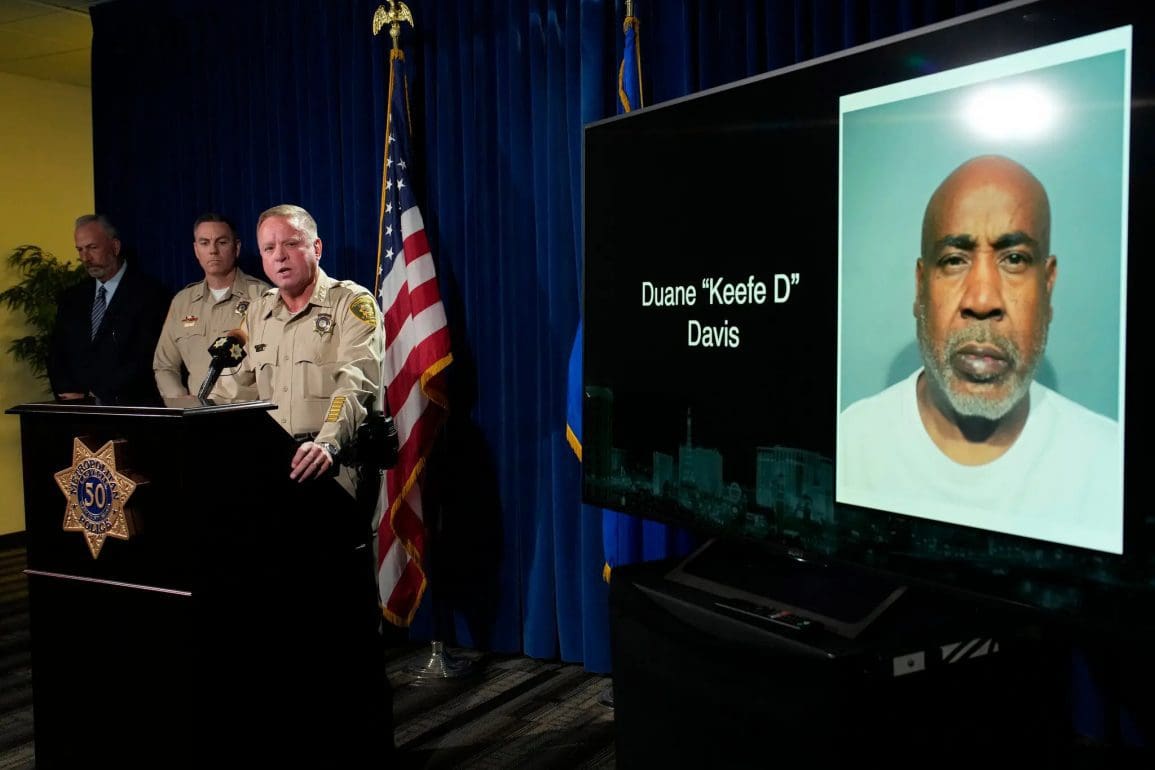
Duane Keith Davis, a former gang leader, has stated that the four fatal shots that claimed the life of rapper Tupac Shakur in 1996 were fired from the vehicle he was a passenger in.
Las Vegas police are holding a briefing after arresting one of the last living witnesses to the 1996 killing of rapper Tupac Shakur. This is a long-awaited breakthrough in a case that has frustrated investigators and fascinated the public ever since the hip-hop icon was gunned down on the Las Vegas Strip 27 years ago.
Over 25 years since the tragic killing of Tupac Shakur, a self-proclaimed gang member named Duane Keith Davis, who has consistently asserted his involvement in the drive-by shooting, has been formally charged with murder, as announced by Las Vegas prosecutors on Friday. This development marks a significant revival of an investigation that had long remained stagnant.
According to Davis’ accounts in interviews and a memoir, he occupied the front passenger seat of a white Cadillac that approached the vehicle carrying Mr. Shakur following a 1996 prizefight between Mike Tyson and Bruce Seldon in Las Vegas. The 25-year-old rapper sustained four gunshot wounds and succumbed to his injuries in a hospital less than a week later.
During a court hearing on Friday, a prosecutor disclosed that a grand jury in Clark County indicted Mr. Davis on one count of murder with the use of a deadly weapon, in addition to a gang enhancement. The Associated Press had previously reported Mr. Davis’ arrest. He is currently in custody without bail.
Despite decades of speculation, ample evidence, and extensive reporting, no charges had been brought forth in the shooting of Mr. Shakur. He was a highly acclaimed artist in the 1990s, known for his tracks that infused confrontational gangster rap with poetic depth. However, discussions surrounding the case were reignited in July when Las Vegas police executed a search warrant at a residence in Henderson, Nevada, linked to Mr. Davis.

In court on Friday, Marc DiGiacomo, Chief Deputy District Attorney in Clark County, asserted that Mr. Davis held the role of “on-ground, on-site commander” who directly ordered the demise of Mr. Shakur and the attempted murder of Marion Knight, commonly known as Suge, the rap mogul who was driving the vehicle with the rapper.
Currently, it remains unclear whether Mr. Davis has legal representation.
In his 2019 memoir, published under the moniker Keffe D, Mr. Davis detailed a gang altercation that escalated after Mr. Shakur and his associates confronted Mr. Davis’s nephew, Orlando Anderson, following the boxing match at the MGM Grand hotel.
Recalling the incident in his memoir, titled “Compton Street Legend,” Mr. Davis remarked, “Them jumping on my nephew gave us the ultimate green light to do something. Tupac chose the wrong game to play.”
As per the filed indictment in Clark County District Court, prosecutors alleged that Mr. Davis procured a firearm “with the intent of seeking retribution against” Mr. Shakur and Mr. Knight. They further contend that he passed the weapon to either his nephew or another occupant in the Cadillac, “with the intent that this crime be committed.” Notably, Mr. Davis is the sole surviving occupant of the vehicle.
During the court proceedings, Mr. DiGiacomo affirmed that the fundamental details of the incident had been in the possession of law enforcement since 1996. He pointed out that what had been missing was admissible evidence to establish the sequence of events. It was only after Mr. Davis began openly discussing his involvement, including his admission in a published book, that this crucial link was provided. In the book, Mr. Davis explicitly acknowledged obtaining a firearm with the intent of pursuing Mr. Shakur and Mr. Knight.
In a Friday news briefing, the Las Vegas police confirmed that Mr. Davis’s public statements had rekindled their interest in the case, particularly highlighting a television appearance he made in 2018. Lt. Jason Johansson of the Las Vegas Metropolitan Police Department emphasized that they recognized this as a potentially final opportunity to pursue the matter.
While Mr. Davis had refrained from directly implicating the individual who discharged the weapon in recent interviews, a taped confession, facilitated by a former Los Angeles Police Department detective who probed Mr. Shakur’s murder, revealed that Mr. Anderson, known as Baby Lane, was the one responsible.
Although Mr. Anderson was interrogated by officers in the investigation of Mr. Shakur’s death, he met his demise in a shooting incident in 1998.
In his memoir, published under the alias Keefe D, Mr. Davis recounted that following the shooting, they abandoned the vehicle and returned to the hotel on foot. The next day, they retrieved the vehicle and transported it back to California. Mr. Davis stated that the car underwent thorough cleaning and repainting before being returned to the rental agency several days later. By that juncture, any prospects of obtaining accurate and reliable forensics were deemed to be beyond reach.

Following Mr. Shakur’s tragic demise, the investigation saw a surge in activity. Over 20 individuals were apprehended in connection with shootings believed to be linked to gang-related incidents, according to police reports.
However, as the years passed without any formal charges, both Shakur’s killing and the subsequent death of his once-friend, turned rival, the Notorious B.I.G., stirred up conspiracy theories and accusations of inadequate police efforts in bringing the perpetrators to justice. The Las Vegas police cited a lack of cooperation from individuals close to Mr. Shakur as a contributing factor to the investigation’s stagnation.
These incidents became the focal points of various literary works, podcasts, television series, and films, further solidifying Mr. Shakur’s legendary status in hip-hop. Renowned for albums like “Me Against the World” and “All Eyez on Me,” the latter being one of the genre’s inaugural double albums, he attained an almost mythical standing.
The reinvigoration of the Notorious B.I.G.’s case by the Los Angeles Police Department in the mid-2000s ultimately prompted a reevaluation of the Shakur investigation. Greg Kading, a detective involved in the reexamination, later penned a book detailing how they persuaded Mr. Davis to collaborate through a proffer agreement, ensuring he couldn’t face charges based on any potentially incriminating statements made during interviews.
“In my memoir, Mr. Davis stated, “I cooperated because they assured me I wouldn’t face prosecution.”
On the night of the shooting, Mr. Shakur was traveling in a BMW driven by Mr. Knight, en route to a post-fight event at Club 662, a newly established venue backed by their record label, Death Row Records.
In his memoir, Mr. Davis, identifying himself as a member of the Crips, detailed that he, along with Mr. Anderson and others, armed themselves and awaited in the nightclub parking lot, intending to confront Mr. Shakur and Mr. Knight, who were affiliated with the Bloods, regarding the prior altercation.
When the rapper didn’t appear, Mr. Davis recounted that their group left for their hotel. However, en route, they unexpectedly encountered Mr. Shakur and Mr. Knight conversing with fans at a red light. Mr. Davis wrote, “As they sat in traffic, we slowly rolled past the long line of luxury cars they had in their caravan, looking into each one until we pulled up to the front vehicle and found who we were seeking.”
According to Mr. Davis, Mr. Shakur’s crew had perpetrated “the ultimate disrespect when they kicked and beat down my nephew” — an act believed to be in retaliation for a prior robbery involving one of Mr. Shakur’s associates. He outlined in his memoir the stringent ethical code governing the streets, a code adhered to with a life-or-death commitment.
“Tupac’s and Biggie’s deaths were direct consequences of that code violation and the explosive fallout when the potent realms of the streets, entertainment, and corrupt law enforcement intersect,” he wrote.
Mr. Davis further disclosed that he had been regarded as a “prime suspect” in both homicides and expressed that penning down these events for his book had a therapeutic effect.
During an interview with DJ Vlad, a notable chronicler of rap history, Mr. Davis was asked if he harbored concerns that his revelations could lead to legal repercussions. He responded with a resolute demeanor, asserting, “They want to put me in jail for life? That’s just something I got to do.”





























